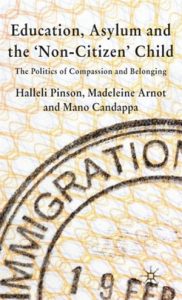Education, Asylum and the 'Non-Citizen' Child: The Politics of Compassion and Belonging

Author(s): Halleli Pinson, Madeleine Arnot and Mano Candappa
Publisher: Palgrave Macmillan
Year of Publication: 2010
Print Length: 224 pages
Genre: Non-Fiction / Social Science, Educational Theory and Practices, Migration & Refugee Studies
Area: The United Kingdom (UK)
Topic: Education, Inclusive Education, Policy & Practice, Asylum & Asylum Seekers, Refugees & Forced Migration, Asylum & Refugee System, Immigration Control, Receiving Country, Citizenship, Politics & Power, Ethics & Morality, Compassion, Belonging, Deserving & Undeserving, Hostility, Children & Childhood, Youth & Youthhood, Globalization, Media & Narratives, Social Cohesion, Inclusivity, Integration, National Consciousness
Refugees are physically and symbolically ‘out of place’ – their presence forces governments to address issues of rights and moral obligations. This book contrasts the hostility of immigration policy to ‘non-citizen” children with teachers’ exceptional compassion and ‘citizen students’ ambivalence in defining who can belong.
‘Education, Asylum and the ‘Non-Citizen’ Child makes a valuable contribution to both refugee studies and the sociology of education. Drawing on multiple empirical sources, it presents a compelling narrative on the contradictions, tensions and idiosyncrasies of the asylum regime vis-a-vis the State commitment to the best interests of children enshrined in national and international laws.‘ – Nando Sigona, Refugee Studies Centre, University of Oxford, Journal of Refugee Studies
Table of Contents
Acknowledgments
Tables
Abbreviations
1. Introduction
Children and the contradictory logics of globalisation / Towards a sociology of education and forced migration / The structure of the book
2. Globalisation and Forced Migration: Challenging National Institutions
The economics and politics of forced migration / The different logics of immigration control / Contemporary images of the refugee and asylum-seeker
3. Researching Compassion and Belonging in the Educational System
The politics of compassion and belonging / How to research forced migration Reflections
4. The Asylum-seeking Child as Migrant: Government Strategies
Granting asylum: a matter of pride or a threat? / The stranger at the gate / The stranger within: the deserving and the undeserving / Marginalisation of the education of asylum-seeking children / Conclusions
5. Devolution and Incorporation: Whose Responsibility
The policy of inexplicitness — devolving responsibility / Local dilemmas / Filling the void: policy discourses
6. Countering Hostility with Social Inclusion: Local Resistances
Local diversities but a common approach / Holistic and multi-agency needs-based approaches / Local community and parental partnerships / Establishing clear indications of successful social inclusion and integration / Conclusions: holistic approaches
7. The Migrant Child as a Learner Citizen
The centring of the asylum-seeking and refugee child as learner / Teachers’ morality: social inclusion and pedagogies of caring / Conclusions
8. Finding Security and Safety in Schools
Acceptance and inclusion / Experiencing exclusions within inclusion / The stranger in ‘our’ midst / Feeling safe? / Conclusions
9. Britishness and Belonging
Becoming ‘British’ / Who can belong? / A matter of compassion? / Conclusions
10. The Politicisation of Compassion: Campaigning for Justice
Narratives of endurance / Political moments: awakening schools / Challenging the system: teachers’ and students’ civic protest / Reflections
11. Conclusions
The economics of belonging and compassion in the UK / Compassion and belonging in the educational system / The politics of schooling / Citizenship, personhood and asylum / A new politics?
Notes
References
Index

Halleli Pinson is Senior Lecturer at Ben-Gurion University of the Negev. Her research focuses on migration and education and in particular on educational policies and practices in relation to the integration of asylum-seeking children. She has published extensively on citizenship education in conflict-ridden societies and is the co-editor of Citizenship, Education and Social Conflict. She is currently the president of the Israeli Comparative Education Society and a member of the editorial boards of the British Journal of Sociology of Education and Race, Ethnicity and Education.
Source: https://link.springer.com/book/10.1057/9780230276505
More from Halleli Pinson in this library, click here.

Madeleine Arnot is Emeritus Professor of Sociology of Education at the University of Cambridge, UK. She has published extensively on educational issues relating to citizenship, gender and social class and race equality, poverty and education and social justice. She established the Centre for the Study of Global Human Movement (2018) at Cambridge, and the Cambridge Migration Research Network (2014). She has researched the integration of newly arrived EAL students in the UK, and currently supports Norwegian and Australian projects on the integration of migrant children. Recent publications included Education, Mobilities and Migration: people, ideas and resources (2016) and artices in Teaching and Teacher Education, and Cambridge Journal of Education on parent-school communication about migrant children’s education.
Source: https://link.springer.com/book/10.1057/9780230276505
More from Madeleine Arnot in this library, click here.

Mano Candappa is Associate Professor of Sociology of Education at University College London Institute of Education, UK. She specialises in migration, forced migration and issues around social marginalization, human rights and education with a particular interest in childhoods and the politics of belonging. She has published extensively on issues around children’s agency, children’s rights and the experiences of refugees and asylum–seeking children and families. Recent publications include Education and Schooling for Asylum-Seeking and Refugee Students in Scotland and policy and practice articles in relation to the education of asylum-seeking and refugee students.
Source: https://link.springer.com/book/10.1057/9780230276505
More from Mano Candappa in this library, click here.
